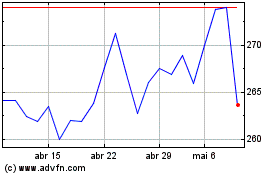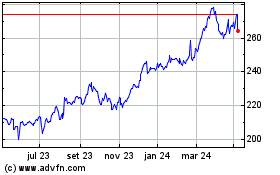Money Managers, Lured by Rich Returns, Venture Into Risky World of Trade Finance
22 Janeiro 2020 - 8:33AM
Dow Jones News
By Joe Wallace
Money managers including Allianz SE and American International
Group Inc. have found a window of opportunity to enter the business
of financing international trade, long the domain of banks.
Banks finance trade deals by offering loans and letters of
credit, as well as through more complex arrangements including the
purchase of an exporter's accounts receivable at a discounted
price. Such deals let lenders shoulder the risk that importers
don't pay on time or exporters don't deliver the goods, greasing
the wheels of international commerce.
Trade finance has historically been dominated by European banks
such as HSBC Holdings PLC and BNP Paribas SA, alongside Citigroup
Inc. in the U.S. But some powerhouses, including Dutch lender ABN
AMRO Bank NV, have dialed back their operations. Others, under
pressure from new capital requirements, are looking to sell their
trade-financing deals, creating an opportunity for new types of
financiers to enter the market.
The interest from some of the world's biggest money managers
signals a potential revival for growth in global trade. In recent
years, the disruption from global trade wars, marked by escalating
tariffs, as well as sanctions triggered by geopolitical
differences, have served to hamper cross-border flows of goods and
services.
Investors finance only a fraction of international goods
exports, which rose to a record $19.5 trillion in 2018, according
to the World Trade Organization. Nonbank financial institutions
bought about $100 billion in trade-finance assets in 2018, but that
could reach $3 trillion in the coming years, according to Christoph
Gugelmann, chief executive of London-based Tradeteq, which runs an
exchange for trade-finance assets.
A $1.5 trillion "trade-finance gap" is holding back
international commerce, the Asian Development Bank said in
September, pointing to the Pacific islands as "an extreme example"
of a region that risks being cut off from the global financial
system if banks retreat from trade finance.
Asset managers say trade financing pays attractive returns
compared with bonds, whose yields have plummeted in recent years as
interest rates dropped to historic lows.
"These investors are looking for alternative asset classes,"
said Dimitri Kouchnirenko, director of Singapore-based Incomlend,
another trade-finance exchange. "They're looking for yield, and
finding yield is very difficult."
But the business can be both hazardous and expensive. Fund
managers, more used to buying stocks and bonds, sometimes find
themselves ill-prepared to assess the risks involved in financing a
diverse and dispersed business that remains dependent on paper
documents for record-keeping and contracts. The perils can include
defective goods, damage to products during transportation, fraud,
or external factors such as weather, tariffs and currency
fluctuations.
To mitigate these risks, large money managers buy trade-finance
assets that lenders have already originated instead of funding
importers and exporters directly. Often these assets are wrapped up
into asset-backed securities.
Allianz Global Investors joined with HSBC, the world's biggest
provider of trade finance by revenue, to set up a fund with just
under $50 million under management last year. Allianz buys
securities backed by trade-finance deals from HSBC and other banks,
via a subsidiary known as a special-purpose vehicle.
Some securities backed by trade financing pay barely positive
yields and are bought by investors seeking a safe place to store
money, according to Tradeteq's Mr. Gugelmann. Others yield around
2% and are typically bought by pension funds and insurers. Riskier
securities, backed by trade financing originated by nonbank
lenders, can yield up to 10% and are purchased by hedge funds.
HSBC has increased the trade financing it sells on to investors
and other lenders from $2 billion in 2015 to $28 billion last year,
said Surath Sengupta, head of trade portfolio management and
distribution at the bank.
"Clearly, the more velocity you can get in terms of
transactions, the more you can continue to grow your business and
not increase your risk-weighted assets," said James Binns, head of
trade and working capital at Barclays PLC. "The complexity is
around investors understanding exactly what they're investing
in."
AIG recently began to invest in trade finance after selling
insurance to the sector for several decades. In September, the
company bought securities backed by receivables as part of an $80
million deal with Cairn Capital Ltd., a fund manager in London.
"Fraud is your biggest risk," said Ihab Salib, a senior
portfolio manager at Federated Investors Inc. One trade-finance
deal that Mr. Salib invested in was secured against what appeared
to be a stockpile of grain. "But when you put a 12-foot pole in the
silo, it was filled with hay," he said.
Federated, which entered the market in 2006, buys trade-finance
assets from banks in syndication deals without slicing them into
securities. Mr. Salib worries that securitization allows banks to
palm off riskier products they don't want to own themselves.
"I want to do deals banks are willing to hold on their own
books," Mr. Salib said. "Someone else needs to have skin in the
game."
Write to Joe Wallace at Joe.Wallace@wsj.com
(END) Dow Jones Newswires
January 22, 2020 06:18 ET (11:18 GMT)
Copyright (c) 2020 Dow Jones & Company, Inc.
Allianz (TG:ALV)
Gráfico Histórico do Ativo
De Nov 2024 até Dez 2024

Allianz (TG:ALV)
Gráfico Histórico do Ativo
De Dez 2023 até Dez 2024
